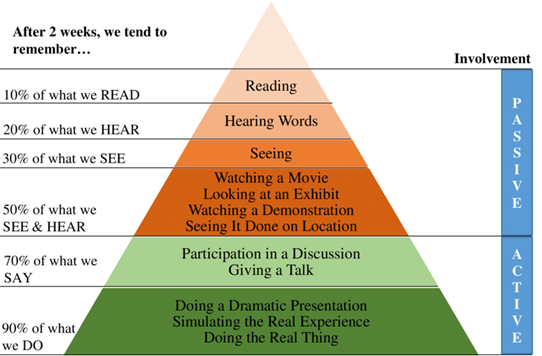Content begins here
Contenido de la página principal
Pulsa para colapsar
Difference between hearing and listening
Introduction
Research suggests that we remember:
-
10% of what we read
-
20% of what we hear
-
30% of what we see
-
50% of what we see and hear
-
70% of what we discuss with others
-
80% of what we personally experience
-
95% or what we teach others
(Dale, 1924)

We constantly listen, to obtain information, to learn, to understand, to assimilate, to seek for explanation, or just for pleasure… However, when it comes to turning those inputs into action, it appears that we remember only 20 to 50% of the entire information received. This means that when someone gives us valuable information or instruction, we simply do not get the entire message, and if we might have captured the most important/ general idea within the 20-50% rate, we will, in any case pass aside important elements. This also means, on the other side, than when we are the ones talking to others, they might forget more than half of our talk.
Once this lesson is completed and approved, learners will be able to:
Differentiate hearing from learning.
Understand the importance of active listening skills.
In this lesson, we will learn how focusing our attention to a given message improves our general communication skill and our capacity to provide proper answers.
Hearing vs Listening
This lesson is presented among contents on active listening. As an introduction, it seems important to start with making the difference between hearing and listening, to avoid future confusions.
According to Cambridge dictionary:
Hear is to receive or become conscious of a sound using your ears. For example: she heard a noise outside, my grandfather is getting old and can’t hear very well, you’ll have to speak up, I can’t hear you.
Listen is to give attention to someone or something in order to hear him, her or it. For example: What kind of music do you listen to? You haven’t listened to a word I’ve said!
| Hearing | Listening |
|---|---|
| Hearing is the perception of a sound | Listening is the understanding of a sound you hear |
| Hearing is one of our senses. It simply happens | Listening is an intentional process aimed at learning |
| Passive – physical process | Active – metal process |
| Involuntary | Voluntary |
| No concentration required | Concentration required |
Active listening is a variation of listening, that goes deeper in the intention and effort of understanding. It refers to the ability to focus completely on a speaker so you clearly get the message and can respond appropriately, improving the mutual understanding.
Why is listening important?
We currently live in an environment where information inputs are omnipresent. With a high density of communication channels and devices everywhere, we now spend most of our time communicating, voluntarily or not. It is nowadays estimated that every individual is for instance exposed to around 5.000 ads per day. In those conditions, it is impossible to remember everything. Therefore being able to focus our attention and select the information is important. And this is why active listening has become a fundamental skill.
Listening is reversal. It is about the capacity to actively pay attention to others, and it is also a way for us to feel understood by others. It then required the other person to focus on what we are expressing.
Active listening allows us, among others, to:
-
Exchange information and knowledge.
-
Develop ideas.
-
Discuss and solve problems.
-
Forge common memories.
-
Create long terms relationships.
Beyond, active listening conveys huge benefits, as it helps build new connections and relationships based on trust and mutual understanding. The attention given to the environment also increases your knowledge of diverse topics and your capacity of detecting early problems and anticipating solutions.
Conclusion
Listening is one of the most important skills one can have. How well we listen has a major impact on our performance and effectiveness, being applied at professional or private levels. It impacts positively the quality of our relationships with others. We listen to obtain information, to understand, for enjoyment, to learn. By becoming a better listener, we can improve our productivity, as well as our ability to influence, persuade and negotiate. What's more, we avoid conflict and misunderstandings.
Video and PDF presentationPulsa para colapsar
The following video explains the content of this lesson and shows some examples:
Video T2.L1. Difference between hearing and listening
Here you have the content of the video in pdf in case you need to use it in your classroom:
Lesson contents in PDFPulsa para colapsar
Here you have the contents of the lesson in PDF:

